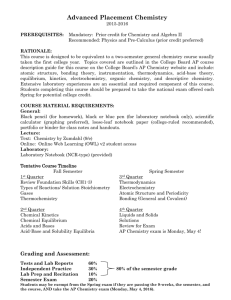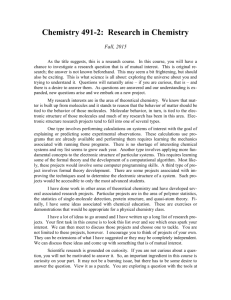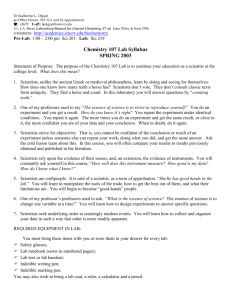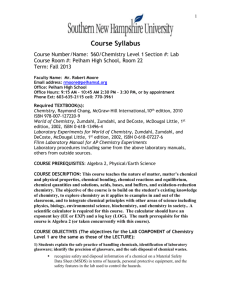AP Chemistry - Cloudfront.net
advertisement
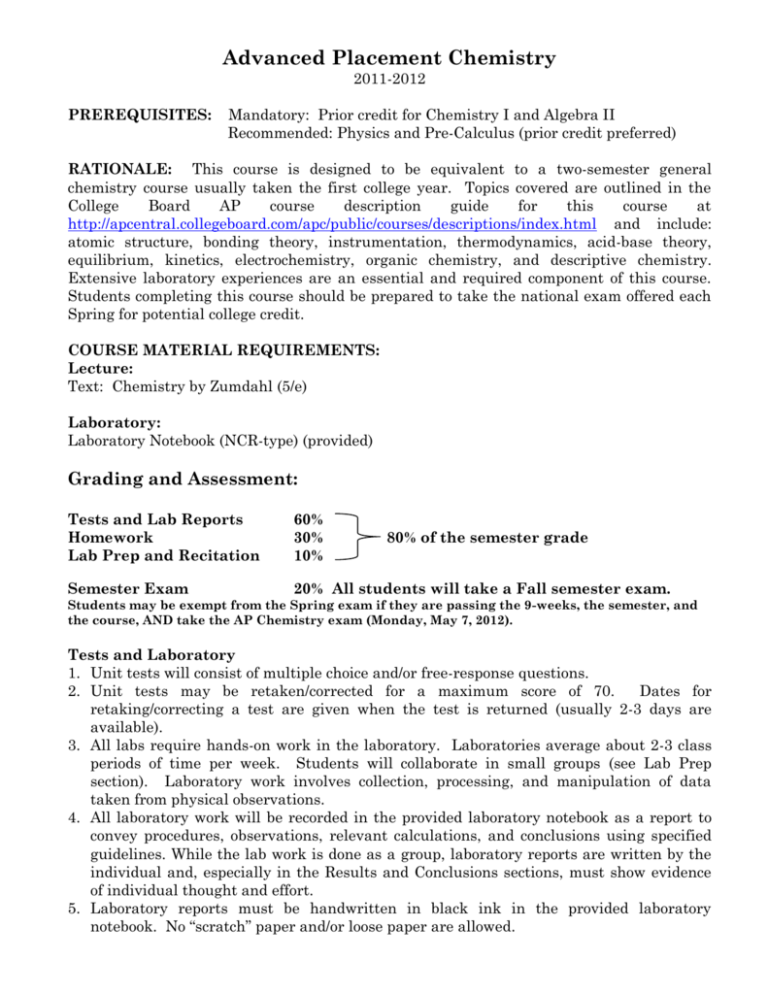
Advanced Placement Chemistry 2011-2012 PREREQUISITES: Mandatory: Prior credit for Chemistry I and Algebra II Recommended: Physics and Pre-Calculus (prior credit preferred) RATIONALE: This course is designed to be equivalent to a two-semester general chemistry course usually taken the first college year. Topics covered are outlined in the College Board AP course description guide for this course at http://apcentral.collegeboard.com/apc/public/courses/descriptions/index.html and include: atomic structure, bonding theory, instrumentation, thermodynamics, acid-base theory, equilibrium, kinetics, electrochemistry, organic chemistry, and descriptive chemistry. Extensive laboratory experiences are an essential and required component of this course. Students completing this course should be prepared to take the national exam offered each Spring for potential college credit. COURSE MATERIAL REQUIREMENTS: Lecture: Text: Chemistry by Zumdahl (5/e) Laboratory: Laboratory Notebook (NCR-type) (provided) Grading and Assessment: Tests and Lab Reports Homework Lab Prep and Recitation 60% 30% 10% Semester Exam 20% All students will take a Fall semester exam. 80% of the semester grade Students may be exempt from the Spring exam if they are passing the 9-weeks, the semester, and the course, AND take the AP Chemistry exam (Monday, May 7, 2012). Tests and Laboratory 1. Unit tests will consist of multiple choice and/or free-response questions. 2. Unit tests may be retaken/corrected for a maximum score of 70. Dates for retaking/correcting a test are given when the test is returned (usually 2-3 days are available). 3. All labs require hands-on work in the laboratory. Laboratories average about 2-3 class periods of time per week. Students will collaborate in small groups (see Lab Prep section). Laboratory work involves collection, processing, and manipulation of data taken from physical observations. 4. All laboratory work will be recorded in the provided laboratory notebook as a report to convey procedures, observations, relevant calculations, and conclusions using specified guidelines. While the lab work is done as a group, laboratory reports are written by the individual and, especially in the Results and Conclusions sections, must show evidence of individual thought and effort. 5. Laboratory reports must be handwritten in black ink in the provided laboratory notebook. No “scratch” paper and/or loose paper are allowed. 6. A “pre-lab” (see Lab Prep section) is assigned for each lab. This section consists of an problem/objective, materials, procedure, and data tables. Students will not be allowed to proceed with the lab unless the pre-lab is completed first. The procedure and format for laboratory reports are specified in the “Laboratory Report” format handout. If there are errors in formatting, the report will be returned for correcting. A penalty of 10pts/return will be assessed. 7. When submitting lab reports, only the yellow sheets (the copy) from the lab notebook are removed, stapled and submitted. 8. Late reports will be assessed a penalty of 20 pts/day. 9. The laboratory notebook is the property of the La Vernia High School. If the notebook is requested by a college/university to determine laboratory credit, please notify the Instructor and arrangements will be made. Homework 1. Homework assignments may be handouts or problems from the textbook. Work must be shown for calculations to receive credit. 2. Homework is graded based on completion and/or accuracy. Students will be given credit for partial work turned on the due date. As we do go over the solutions and answers in class, no late work will be accepted. Lab Prep and Recitation 1. Pre-lab (intro, materials, procedure, and any data tables), set-up, clean-up of the laboratory area, and participation in the lab activity will be evaluated separately from the lab report. 2. Students will not be allowed to proceed with the lab unless the pre-lab is completed first. A late penalty (25 pts) will be incurred if the pre-lab is not complete by the beginning of the lab period but is completed during the period before the student begins the lab work. Students not completing the pre-lab are choosing to work alone—not in a group—on the assigned lab. 3. At least once per grading cycle, small groups or individuals will be assigned an advanced problem from the current unit to present to the class. Students will be graded on their completeness and clarity (per rubric) in presenting the solution of the problem to the class. Visual aids must be employed (marker board, poster board, Powerpoint presentation) to help in the explanation of the problem. 1st Semester ‘11-12 Tentative Course and Lab Schedule-AP Chemistry (Text: Zumdahl) Chapter(s)-Topic(s) Week of 08/22-08/31 1,2-Chemistry Fundamentals TEST (Ch 1-2) 08/31 09/05-09-12 09/12 09/19 09/19-10/03 Lab: Determination of the Molar Mass of Gases and Volatile Liquids 3-Stoichiometry Lab-Analytical Gravimetric Analysis of a Metal Carbonate TEST (Ch 3) 09/12 Lab-Determination of the Empirical Formula of Silver Oxide 10/05 CH4 and AP Chemical Reactions-handouts 09/26 Lab-Analysis of Aluminum Potassium Sulfate 10/03 Lab-Determination the Stoichiometry of Chemical Reactions 10/17 Lab: Separation and Qualitative Determination of Cations and Anions TEST (Ch 4 and handouts) (END OF 1st Quarter) 10/24 5-Gases 10/24 Lab-Determining the Molar Volume of a Gas TEST (Ch12) 10/31-11/07 11/07 7-Atoms, Molecules, Ions 11/14 Lab-Separation by chromatography (15) TEST (Ch 5-6) 12/05 10-Liquids and Solids 12/05 Lab-Triple point of dry ice (handout) 11/28 12/05 11-Solutions Lab: Molar Mass by Freezing Point Depression TEST (Ch13,14) 12/16-12-26 11/07 8,9-Bonding TEST (Ch 7-9) 12/16 10/31 Lab: Enthalpy of Reaction, Hess’s Law and Calorimetry 11/14 12/12-01/02 10/17 6- Thermochemistry TEST (Ch15) 11/28 09/02 21-Nuclear Chemistry (Take-home) Semester Exams (END of 2nd Quarter and 1st Semester)) 01/02 01/02/2012 on 01/06 2nd Semester 2010 Tentative Course and Lab Schedule-AP Chemistry Week of Chapter(s)-Topic(s) Due 25-Coordination Compounds 01/27 Lab: Synthesis and Analysis of a Coordination Compound 02/03 TEST (Ch25) 27,28-Organic Chemistry and Polymer Chemistry (TBA) 02/08 Lab: Synthesis, Isolation, and Purification of an Ester 02/15 TEST (Ch27,28) 16-Kinetics 02/23 Lab-Study of the Kinetics of a Reaction 02/22 TEST (Ch16) 10-Acids, Bases, Salts 03/12 Lab: pH and Buffers 03/08 Lab: Selecting Indicators for Acid-Base Titrations 03/23 17-Equilibrium 03/25 Lab: Exploring LeChatelier’s Principle—Gaseous Equilibriums 03/30 Test (Ch10,17) 18,19,20-Ionic Equilibria 04/14 Lab: Determination of Ka of a Weak Acid 04/05 Lab: Determination of Keq for FeSCN2+ 04/19 TEST (Ch18,19,20) 21-Electrochemistry (handouts) 04/23 Lab: Oxidation-Reduction Titrations 04/26 Lab: Electrochemical Cells and Activity Series 05/03 TEST (Ch21) Review for AP Exam! AP Chemistry Exam!!! Lab-Growing crystals in gels (handout) Lab: Anodizing Titanium (handout)

